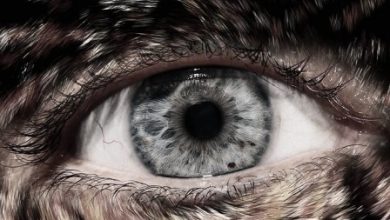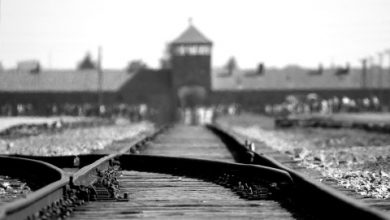
The White Wolf of the Hartz Mountains by Frederick Marryat is a story published in Volume 56 of The New Monthly Magazine and Humorist in 1839 and become a part of “The Phantom Ship” book. A father with his three children lives in the Hartz Mountains, he takes a new wife with strange wedding vows which later turn out to have deadly consequences. The mysterious white wolf turns out to be an evil spirit taking vengeance. This story explores the themes of femininity, fate, vengeance and the supernatural. This is also considered the first work of werewolf fiction in western literature.
The White Wolf of the Hartz Mountains | Summary
Hermann Krantz and Phillip leave behind a troop arguing over gold and set sail on a boat. Hermann Krantz narrates an extraordinary tale to Phillip. Hermann’s father was a serf in Transylvania, however, he wasn’t poor, he was a wealthy man who’s been promoted to stewardship by a Hungarian nobleman. One day he comes home to find his wife having an affair with a Hungarian nobleman. He murders them both right away and flees the country with his children- Caesar, Hermann and Marcella. They take refuge in a small cottage hidden in the Hartz Mountains. Krantz becomes very bitter due to emotional stress and turns cold and abusive towards his children.
One night they hear the growl of a wolf near their window, Krantz takes his gun and goes out to hunt the wolf. The wolf walks away and Krantz follows him, it’s a rare white wolf that will make a good hunt. He unintentionally enters a forbidden part of the forest where spirits are rumoured to be moving. There he meets two people, a hunter man Wilfred of Barnsdorf and his daughter Christina. They claim that they’re from Transylvania and are running away from justice as Wilfred has stabbed a nobleman who was coming after his daughter. They ask for Krantz’s help to get food and shelter, Krantz takes them to his cottage where they stay for three weeks. All three Krantz children are afraid of Christina as they see “cruelty” in her eyes but she appears to be a very beautiful and loving girl.
Krantz asks for Christina’s hand in marriage to which Wilfred agrees but puts forth a condition. Krantz has to make a vow, never to hurt Christina otherwise he and his children shall perish. After their marriage, Christina becomes very cruel towards the kids and abuses them. The kids witness her frequently going out at night which is followed by a growling of a wolf. Caesar decides to follow her one night and he ends up getting mauled to death by a wolf. Krantz is terribly upset at his son’s death and buries him the next day with a lot of precautions so that wolves don’t dig up his grave. But a few days later he finds the grave has been opened and his son has been devoured. Hermann is very afraid as he suspects their stepmother’s involvement in his brother’s death.
After a while, Marcella is mauled to death as well by a white wolf while she was home alone. Krantz is more upset and cries to see his poor girl dead. Hermann is shaken but his fears for once subside as he tries to discover the truth. He sees Christina go out again at night and opens the door to see what she’s doing. He sees her digging Marcella’s grave, he runs to wake up his father. Krantz runs out with his gun to see his wife eating his daughter’s corpse. He shoots her and they find out that instead of a human body there’s a dead white wolf where Christina was. Wilfred comes the next day screaming that Krantz broke his vow thus now he must suffer, he then reveals that Krantz’s murders made the mountain spirits create this whole conspiracy to punish him. Krantz flees with Hermann to Amsterdam but dies a couple of days later out of fever and madness. Hermann remains safe for a while and grows up to be a sailor.
Here Hermann Krantz ends his narration and claims to Phillip that he has a presentiment that he might die soon, Phillip doesn’t believe him. They land ashore on an island to take some fresh water, they take a bath in a spring and Hermann offers his gold to Phillip since he senses he will die soon. A tiger jumps out of the forest and kills Hermann Krantz. Phillip is awfully upset to lose his friend but decides to sail ahead towards his destination.
The White Wolf of the Hartz Mountains | Analysis
This story is credited as one of the first literary instances of the first appearance of the female werewolf in Western literature. It’s also credited with popularizing werewolves with white fur. Marryat’s “The White Wolf of Hartz Mountains” is considered a pioneering work in gothic werewolf fiction and it has inspired many stories in that genre. Transylvania and Christina’s wanderings at night are also similar to “Dracula”, another example of gothic fiction. The story has a fairy tale quality to itself, the setting of a wild mountain forest provides enchanting and supernatural feelings. The cruel stepmother, the children being hunted by an evil spirit and breaking a vow turning into a deadly curse, all these elements represent a mystical fairy tale.
It’s obvious that Krantz loves his children but he still abuses them, their mother’s infidelity turned him into a murderer and weakened his emotional strength. This weak emotional state allowed the mountain spirits to manipulate him and target his family. Krantz marries Christina so she can become a mother to his children and for that; he has to make a vow to never harm her. Ironically Christina turns out to be a werewolf who murders and eats two of his children; he kills her to protect his surviving son but that initiates the curse and Hermann eventually dies too.
The story speaks of male dominance because his wife cheats on him Krantz comes to despise all women and takes out his anger on his daughter Marcella. To his sons, he is simply controlling but he violently hits his daughter and inflicts her with injuries. Still, the kids loved their father and as we later see Krantz too loved them a lot. His isolation from living in the cold mountains and his emotional struggles made him turn abusive although all this doesn’t justify his actions it makes it clear that his abusive nature arises from his suffering. Christina is a symbol of feminine power that challenges male dominance; she has been portrayed as a typically evil stepmother who beats the children whenever their father isn’t around. She knows the kids know that something isn’t human about her so she lashes out at them especially Marcella who has the strongest dislike towards her. In the end, she is killed by her husband and thus the male dominance reinforces itself.
There are supernatural elements in the story, Wilfred of Barnsdorf and Christina are part of the mountain spirits, Wilfred demonstrates the ability to become intangible, and Christina is a werewolf. Their power allows them to hunt murders but they also possess the ability to harm the loved ones of the murderer. They never try to harm Krantz directly instead they feed upon his children, they don’t wish to achieve Krantz’s death they want to make him suffer emotionally and make his life a living hell. Wilfred says that the spirits have power over murderers suggesting that they worked together to avenge the murders Krantz committed in Transylvania. The wedding vows contain ominous phrases such as that the mountain spirits have “power for good or for evil”.
The White Wolf of the Hartz Mountains | Themes
Femininity
The women in the story are portrayed as an inversion of the ideal Victorian women. They are not virtuous or submissive. Krantz’s first wife commits infidelity and falls into traps of desire and seduction she’s even described as “more beautiful than virtuous”. Similarly, Christina is described as a very beautiful woman, with an unusually large mount and huge teeth, she has a monstrous interior, and she preys on the flesh of Kartz’s children. She’s a beast and far worse than Krantz’s first wife, she conceals her inner monster with her lovely beauty but the kids realize that there’s something wrong with her. They sense evil in her eyes. Mothers are supposed to nurture and provide love to children but Christina cannibalizes her stepchildren, this inversion of character depicts a terrifying and horrible image. Christina is neither a loving wife nor a caring mother; she rejects the prospect of maternal responsibilities. She leaves her home every night to wander the forests, thus showing her wildness. She has no children of her own which further emphasizes her rejection of motherhood and domestic life. She devours her step-children which symbolizes her evilness and beastly desires. Christina’s transformation into the wolf at the end represents how suppressed women can turn into monsters.
Fate
Wilfred lets Krantz live instead of hurting him for killing Christina because he knows that it’s the worst punishment for him. Krantz has to live with the guilt that his innocent children suffered violent deaths due to his marriage and by killing Christina he doomed the faith of his third child as well. All this is a consequence of him committing two murders; he is being punished by the spirits for his sins. The vow Krantz makes clearly states the horrible fate that awaits his children, “may all the vengeance of the spirits fall upon me and upon my children; may they perish by the vulture, by the wolf, or other beasts of the forest; may their flesh be torn from their limbs, and their bones blanch in the wilderness”, as Hermann leaves the mountain and remains at sea for a long time he manages to survive for a long time but when they are near a forest the curse activates itself again and a wild beast takes away Hermann’s life.
The White Wolf of the Hartz Mountains | About the Author
Frederick Marryat (1792 –1848) was a novelist and a captain in the Royal Navy. His writing style includes semi-autobiographical and direct narrative. He is best known for pioneering nautical fiction and werewolf fiction in the Victorian era. He was also an associate of Charles Dickens. His popular works include “Mr Midshipman Easy” (1836) and “The Children of the New Forest” (1847).




